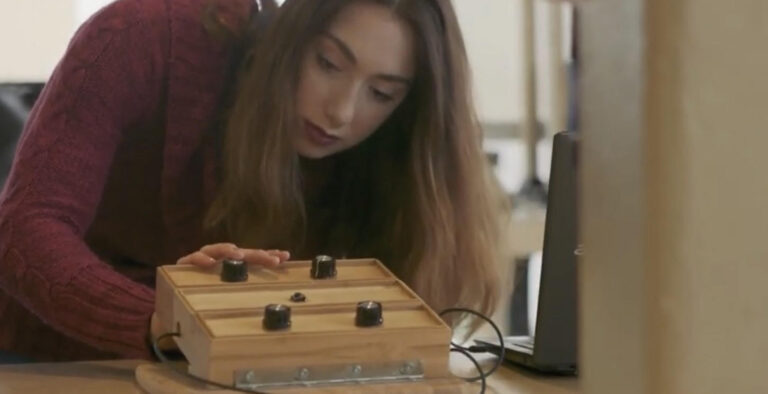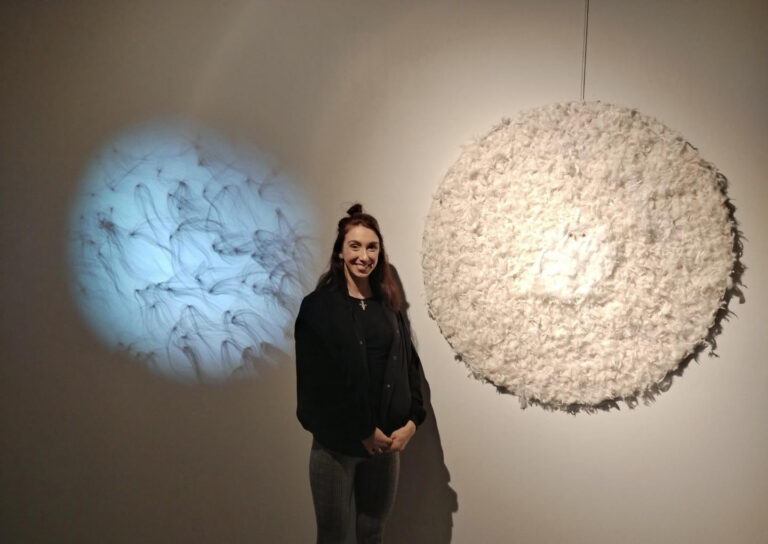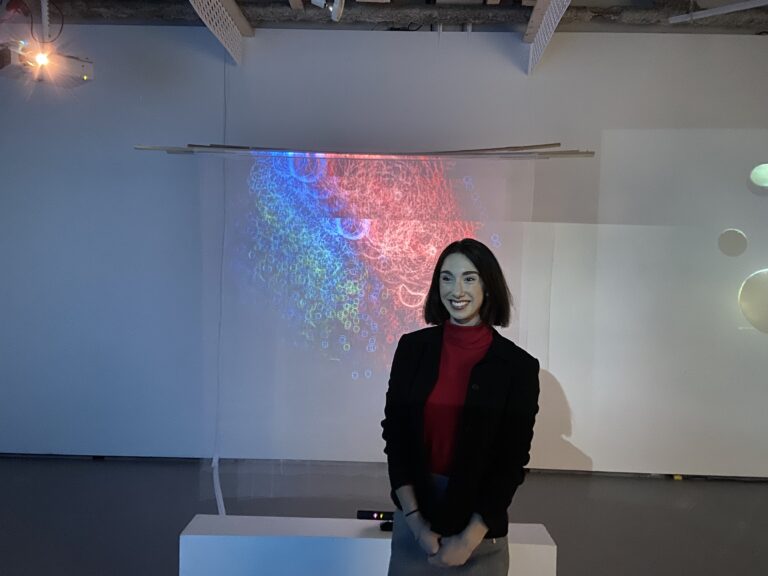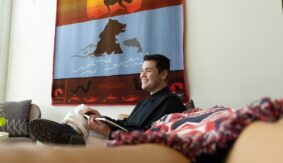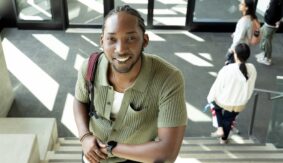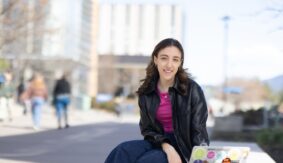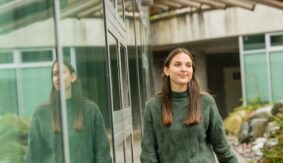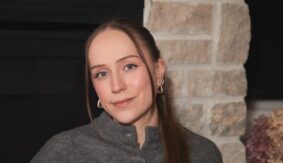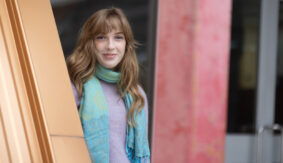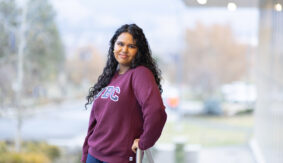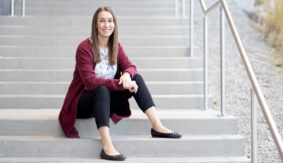
Lark Spartin had always been interested in creating films, but wanted to explore other ways of making art – all without narrowing down her career options. She found the ideal program at UBC.
Lark applied to the Bachelor of Media Studies because she was excited to learn how technology could be used to enhance creativity. Coming to UBC without any prior experience, she was initially worried about the program’s compulsory coding courses. Now in her fourth year, she’s proud to have mastered multiple coding languages, and has seen her creations in film and animation, website design, mobile app prototypes, and interactive art installations come to life using her computer-based skills.
Why did you choose UBC Okanagan?
I chose UBC Okanagan because it was close to home and family, and I was very attracted to UBC’s commitment to research, knowledge, and growth. I like that it is a small campus which offers intimate class sizes, and a community where I can easily interact and network with possible employers and my professors. I have been able to accomplish great work that I never thought was possible based on my professors’ investment in my studies and their commitment to my growth. Kelowna is a very fast-growing city, and has many opportunities for professionals pursuing a career within tech or design.
How did you decide on the Media Studies program?
Many years before I started university, I had my heart set on pursuing a Motion Picture Arts or a Film Production degree. I knew I was interested in digital media as a whole, but I wasn’t sure what aspect, and I wanted to pursue a degree that was broad enough to learn about many different topics. I was also interested in the business side of things – I wanted to learn how to use my creative skills in a professional setting, and how I could use design to contribute to business goals. This led me to consider Management, but I felt unfulfilled not being able to practice my passion or explore my creative side.
I realized that ever since I was young – when I built stage sets, created scripts for plays, and filmed videos – making art and creating was always part of who I was. I knew that I wanted to go to university so that I could pursue a high-paying job in the future, and turn my passion for creation into a career. When I discovered the Media Studies program, I was attracted to how I could explore many different subsets of media such as visual art, computer science, animation, film, graphic design, branding, marketing, user experience design, and digital humanities.
“Developing independence and confidence in my work has been huge for my personal and professional growth.”
How does technology and creativity interact in the program?
Throughout my advanced media art classes, I saw ideas come to life because of technology. I’ve had a vision in my head and been stuck not knowing how to implement it, and have found an easy fix by using a line of code. I’ve been able to test ideas using technology, and create mock-ups of a concept quickly. I started to see my art bloom when I took a Computer Creativity course in first year that explored computer-generated art, and now that I am entering my final year of the program, I see that technology is allowing my whole generation to connect to each other and explore creativity in a way that previous generations couldn’t.
How do you feel about the coding element of the degree?
Going into my first year, I knew nothing about coding. I remember the summer before I went to UBC, I bought an intro to Javascript book. I remember reading through it and being so stressed because even the most basic first chapter made no sense. I was always good at math, but I started to doubt if computer science was something that I would be interested in, or if it would be of use to me in the career I wanted.
In my first two years I took seven Computer Science courses. Even though it was really tough, I can proudly say that coding has become more natural for me, and it’s like learning a new language. I do still lean more towards the visual arts side of Media Studies, but coding was an essential part of my artistic development in the program. Without that, many ideas I have had for my projects wouldn’t have been able to come to fruition. Coding has played a large part in my art practice, allowing me to add interactivity to my art, understand how to manipulate image and movement, and allowed for a better understanding of design and composition in general. Having those skills has made me a better artist.
What are some of the projects you’re most proud of?
The biggest breakthrough for me was in my third year Immersive Installation class. I created a gallery installation called Gestures, which combined the Processing coding platform with Microsoft Xbox Kinect to create a computational drawing machine that tracked human movement. When a viewer moved in front of the piece, colorful shapes would appear on the screen and follow their movement. This allowed people viewing the piece to be able to draw on the screen with their body and create their own piece of art. The project was inspired by a desire to explore movement as an art form, where the human body functions as an expressive brush in digital form.
In my third year, I created a data visualization that shows mass shootings in the US between 1982 and 2019 and a video gallery installation that demonstrates the population decline of the snowy owl, where moving coded feathers are projected onto a textured screen. I completed an interactive documentary on breast cancer awareness, a documentary on suicide awareness, and a motion graphic animation piece featuring my own sketches that tangibly represented emotions such as love, grief, hurt, and anxiety through abstract visual media.
In my Digital Humanities classes, I was able to encode a chapter from the novel Dracula, and make humanistic arguments through digital visualizations. I also helped create a working mobile prototype for a party planning app, and was able to gain experience by researching each phase from user experience design through to testing our app and evaluating its effectiveness.
What do you wish that people knew about Media Studies before applying?
Going into the Media Studies program, I did not expect the amount of hands-on experience I would get, or the skills I would develop. It’s not just art, and it’s not purely science, so being open to the many different disciplines that get thrown at you is essential. The Media Studies program is very interdisciplinary and encourages exploration. I came in to the program expecting that I would later pursue a career solely in film, but that has changed to exploring my options within user experience design, communications design, digital marketing, and creative direction. Having an open mind and not limiting yourself to one type of media will be the most helpful in your future career endeavours. Being able to explore that in an academic setting, where you have access to professors with experience, is invaluable.
Being pushed outside of my comfort zone in this program was what I needed to be able to create work that I was really proud of, and to learn things that I wouldn’t necessarily have thought I was interested in.
When you aren’t studying, what are you usually doing?
During this unprecedented time, I’ve worked on incorporating four main things into my everyday life: movement, mindfulness, mastery, and meaningful connection. Because a lot of my work is computer-based, I like to take time to be active – I love weightlifting and taking walks in nature. I try to take time every day to meditate or focus on my goals and what I’m grateful for. Taking time away from work to focus on what you love to do, or learning something new, is so important! I try to feed my creativity daily and work on personal projects, whether that is simply painting or drawing, or researching a new idea I have for a piece of artwork. Finally, making time to meaningfully connect with the people I love (virtually or otherwise!) really helps to fill me up and feel inspired.
How have your studies helped your career so far?
My studies fostered the passion and confidence to navigate digital tools, but also the ability to welcome interdisciplinary careers and approaches to work. This year, I am completing my co-op placement at the College of Graduate Studies at UBC Okanagan as a communications coordinator. Throughout my time here, I have been able to lead the design of a graduate student orientation Canvas module, develop a content strategy that makes the College’s communications more diverse and engaging, build new website layouts, develop visual communication assets for social media, create communications and promotion plans, and lead the creation of an alumni speaker series and build its visual identity.
I am learning about how my skills can be applied to different disciplines, and the role of design within higher education and communications. I’ve been able to get hands-on project management experience, and lead a real project through ideation, research, design, and evaluation, which helps me understand the strategy behind what I am creating.
What’s the best part about your experience at UBC Okanagan?
The best thing about UBC Okanagan is how everything is accessible to you, and the commitment that the school has to your development – not only within your studies, but also personally and professionally. Even during this time of online learning, UBC Okanagan offers so many resources to make your university experience as enriching as possible, such as virtual therapy, wellness resources, tutoring, fitness classes, career resources and advising. A student can forge a personal relationship with their professors and be on a first-name basis with them. It feels like you are more than just a number, and they recognize that you are a student with needs outside of academics.
